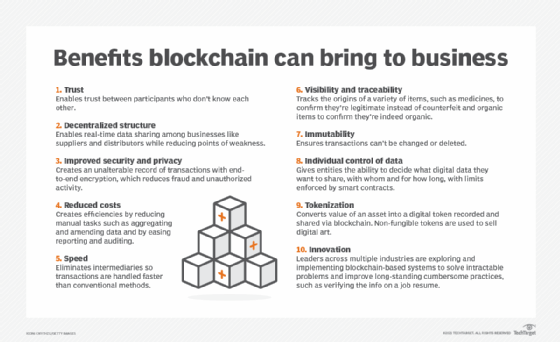Blockchain technology has emerged as a transformative force across various industries, revolutionizing the way businesses operate. This decentralized and transparent ledger system offers numerous benefits, enhancing efficiency, security, and trust. From streamlining supply chains to enabling secure data management, blockchain’s potential applications are vast and continuously evolving. This article delves into the diverse ways blockchain can be harnessed by businesses to drive innovation and gain a competitive edge.

Blockchain technology, initially known for its role in cryptocurrencies like Bitcoin, has gained immense traction for its potential to revolutionize various business processes. At its core, blockchain is a distributed ledger that records transactions across a network of computers. This decentralized nature ensures transparency, immutability, and security, making it an attractive solution for a wide range of challenges faced by businesses. The potential applications of blockchain extend far beyond financial transactions, encompassing diverse sectors such as supply chain management, healthcare, and government services.
Supply Chain Management
Blockchain’s ability to track and trace goods throughout the supply chain offers significant advantages for businesses. By recording each stage of a product’s journey, from origin to delivery, blockchain provides an immutable and transparent record, eliminating the risk of fraud or tampering.
- Enhanced Transparency and Traceability: Every transaction and movement of goods is recorded on the blockchain, allowing businesses to track the provenance of products with complete accuracy. This transparency improves accountability and reduces the risk of counterfeit goods entering the supply chain.
- Improved Efficiency and Cost Savings: Blockchain streamlines supply chain processes, reducing the time and resources required for manual tracking and reconciliation. Automated processes and real-time data visibility contribute to faster delivery times and reduced inventory costs.
- Increased Security and Trust: Blockchain’s decentralized nature ensures data integrity and security. The immutability of the ledger prevents tampering and manipulation, fostering trust among all stakeholders involved in the supply chain.
- Streamlined Payment Processes: Blockchain facilitates secure and efficient payment transactions between suppliers, manufacturers, and retailers. Smart contracts automate payments based on predefined conditions, eliminating the need for intermediaries and reducing processing times.
- Reduced Counterfeit Products: By providing a transparent and auditable record of goods, blockchain makes it difficult for counterfeit products to enter the market. This enhances brand reputation and protects consumers from fraudulent products.
Data Management and Security
Blockchain’s decentralized and secure nature makes it a highly effective solution for managing and protecting sensitive data. By storing data across multiple nodes on the network, blockchain eliminates single points of failure and reduces the risk of data breaches.
- Enhanced Data Security: Blockchain’s decentralized architecture ensures that data is not stored in a single location, making it more resistant to cyberattacks and data breaches. The cryptographic algorithms used for encryption further enhance data security.
- Improved Data Integrity: The immutability of the blockchain ledger prevents unauthorized data manipulation. Once data is recorded, it cannot be altered or deleted, ensuring data integrity and reliability.
- Enhanced Data Privacy: Blockchain allows for data access control mechanisms, enabling businesses to restrict access to sensitive information to authorized users. This enhances data privacy and complies with data protection regulations.
- Reduced Costs Associated with Data Management: Blockchain’s automated processes and decentralized nature reduce the costs associated with data storage, security, and management. This allows businesses to allocate resources more efficiently.
- Improved Data Collaboration: Blockchain enables secure and transparent data sharing between multiple parties, facilitating collaboration and information exchange. This is particularly valuable in industries where data is siloed across different organizations.
Financial Services
Blockchain technology is revolutionizing the financial services industry, enabling faster, more secure, and cost-effective transactions. From cross-border payments to microfinance, blockchain offers innovative solutions for various financial challenges.
- Faster and Cheaper Cross-Border Payments: Blockchain eliminates the need for intermediaries in cross-border payments, reducing processing times and costs. This benefits businesses with global operations by simplifying and accelerating international transactions.
- Improved Financial Inclusion: Blockchain enables the creation of decentralized financial systems, providing access to financial services for underserved populations, such as those living in remote areas or without access to traditional banking institutions.
- Enhanced Security and Transparency: Blockchain’s cryptographic security measures and transparency enhance the security and trust in financial transactions. This reduces the risk of fraud and improves accountability.
- Smart Contracts for Automated Agreements: Smart contracts automate complex financial agreements, eliminating the need for manual processing and reducing the risk of errors. This streamlines financial transactions and enhances efficiency.
- Digital Identity Management: Blockchain can be used to create secure and verifiable digital identities, facilitating KYC (Know Your Customer) processes and reducing fraud in financial services.
Healthcare
Blockchain’s potential to transform the healthcare industry is immense. It can enhance data security, streamline patient records, and enable secure sharing of medical information.
- Secure and Efficient Electronic Health Records (EHRs): Blockchain can be used to create secure and immutable EHRs, allowing patients to control their medical data and share it with healthcare providers securely. This improves patient privacy and reduces the risk of data breaches.
- Improved Drug Supply Chain Management: Blockchain can enhance drug traceability, preventing counterfeit medications from entering the market and ensuring the authenticity of pharmaceuticals.
- Streamlined Medical Billing and Insurance Claims: Blockchain can automate medical billing and insurance claims processes, reducing administrative costs and processing times.
- Enhanced Data Sharing and Collaboration: Blockchain enables secure and transparent data sharing between healthcare providers, researchers, and patients. This fosters collaboration and facilitates medical research.
- Personalized Medicine and Health Analytics: Blockchain can be used to create secure platforms for collecting and analyzing patient data, enabling personalized medicine and improving health outcomes.
Conclusion
Blockchain technology offers a vast array of potential applications for businesses across various industries. Its decentralized, transparent, and secure nature empowers businesses to streamline processes, improve efficiency, and enhance trust among stakeholders. From managing supply chains to securing data and revolutionizing financial services, blockchain’s transformative capabilities are unlocking new opportunities for innovation and growth.
As blockchain technology continues to evolve, its impact on businesses will only become more profound. Businesses that embrace blockchain and explore its potential applications are well-positioned to gain a competitive advantage in the digital economy. By leveraging the power of this transformative technology, businesses can unlock new efficiencies, enhance security, and build a more transparent and trustworthy future.
